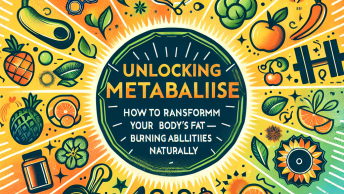10 Fat Loss Myths and Facts: Separating Fiction from Reality
In today’s world, the quest for fat loss can seem like navigating a minefield of misinformation. With numerous myths floating around, it’s easy to get confused about what truly works and what doesn’t. In this article, we’ll debunk ten common fat loss myths by laying out the facts, so you can shed those extra pounds effectively and safely.
-
Myth: Spot Reduction Works
- Fact: Spot reduction, or the idea that you can lose fat from a specific area by exercising that part of the body, is a widespread misconception. The truth is, fat loss occurs throughout the body based on overall activity level and calorie deficit, not by targeting specific areas. You might tone muscles in areas you focus on, but the fat covering them will decrease only as part of a comprehensive fat loss strategy.
-
Myth: Carbs Are the Enemy
- Fact: Carbohydrates have been unfairly vilified in recent years. While it’s true that excessive consumption of refined carbs can contribute to weight gain, whole grains, fruits, and vegetables are essential for a balanced diet. Carbs are a vital energy source, and the key is quality and quantity. Opt for whole, unprocessed carbohydrates and monitor consumption to support fat loss.
-
Myth: Eating Fat Makes You Fat
- Fact: Not all fats are created equal. Healthy fats, such as those found in avocados, nuts, and olive oil, are crucial for bodily functions and can aid in fat loss by keeping you full. Trans fats and excessive saturated fats should be avoided, but healthy fats can be part of a balanced diet that supports weight management.
-
Myth: Skipping Meals Aids Weight Loss
- Fact: Skipping meals can often lead to overeating later in the day and can negatively impact metabolism. Studies have shown that regular, balanced meals throughout the day help maintain energy levels and support metabolic health. The key is not to skip meals, but rather to make healthier food choices consistently.
-
Myth: Only Intense Workouts Result in Fat Loss
- Fact: While high-intensity workouts burn a significant number of calories, they aren’t the only path to fat loss. Moderate-intensity activities like walking, cycling, and swimming can also be effective, especially when combined with a healthy diet. Consistency and a balanced approach to fitness are more sustainable and beneficial over time.
-
Myth: All Calories Are Created Equal
- Fact: While it’s true that a calorie is a unit of energy, not all calories have the same effect on your body. Nutrient-dense foods provide essential vitamins and minerals that support metabolic health, whereas empty-calorie foods offer little nutritional value. For effective fat loss, focus on the quality of the calories consumed and not just the quantity.
-
Myth: Supplements Can Replace a Healthy Diet
- Fact: Supplements should not be considered a substitute for a nutritious diet. While some can aid in weight management, a well-rounded diet rich in whole foods is the most sustainable approach to health and fat loss. Always consult with a healthcare professional before introducing supplements into your regimen.
-
Myth: You Can Out-Exercise a Poor Diet
- Fact: No amount of exercise can compensate for a poor diet. Nutrition plays a pivotal role in fat loss and overall health. Exercise is a critical component, but without aligning your dietary habits, results will be limited. Prioritize nutrition first, and complement it with a regular exercise routine for the best outcomes.
-
Myth: Quick Fixes and Fad Diets Work
- Fact: Quick fixes and fad diets often promise miraculous results but are not sustainable in the long term. They can lead to temporary weight loss, but typically end in regaining the lost weight. Sustainable fat loss requires a lifestyle change—slow, steady modifications to eating and activity habits ensure long-term success.
- Myth: Fat Loss Equals Better Health
- Fact: While maintaining a healthy weight is important, fat loss alone does not guarantee improved health. The focus should be on overall well-being, including mental health, nutrition, exercise, sleep, and stress management. A holistic approach will yield better health outcomes than focusing solely on the number on the scale.
Understanding these myths and separating them from facts will equip you with the knowledge needed to embark on a successful fat loss journey. If you’re looking for scientifically-backed solutions and more insights into losing fat effectively, consider exploring further resources available online. "Click Here to learn more" about optimizing your fat loss strategies.
In conclusion, the path to effective fat loss is paved with knowledge and consistency. By debunking these myths, you’re now more prepared to approach fat loss with realistic expectations and strategies that truly work. Remember, success in weight management is best achieved through sustainable lifestyle changes rooted in factual evidence. Use this knowledge to guide your journey, and embrace the process with patience and perseverance.






